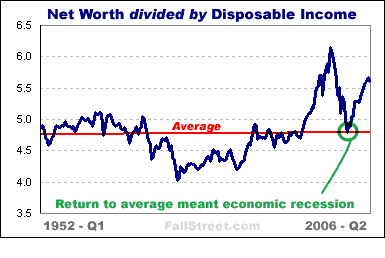|
September 22, 2006
A Trillion Here A Trillion There
In 1999 113 out of a record 467 IPOs went up by more than 100% in the first day of trading. Not convinced that this stat alone is telling of a speculative mania? Well, consider the following: today the China Merchants Bank IPO gained an incredible 25%!...or nearly 28-times less than Linux gained during its IPO day nearly 7-years ago.
Suffice to say, the 1990s stock market mania was one of the greatest speculative manias of all time, and when it went bust trillions of dollars quickly vanished. You would think that such a massive destruction of wealth would have spawned a more serious recession than it did. But alas, as stocks crashed from 2000-2002 gains in the housing market helped cushion the blow.
 |
As the above chart demonstrates, the net worth position of households increased dramatically compared to income in the late 1990s. However, almost equally impressive has been the increase in net worth (compared to disposable income) since 2002. Point being, if you back out the stock market bubble, today’s housing market bubble looks extra ominous. At the threat of overkill here is the visual:
So, a jump in housing prices counteracted the decline in stock prices, and this helped keep the 1990s wealth effect going. Now comes the tricky parts: housing prices are no longer going up, the net worth position of households has already started to stagnate, and consumers are trying to keep their spending habits intact by borrowing more from savings. This recipe can not be made to taste good by small wage gains alone.
In 2001 the mania market speculators disappeared and IPO issuance fell by 78% year-over-year. In 2006 the housing market speculators are starting to disappear and permits are in freefall for the first time in a long time.
In short, weakness in the U.S. housing market doesn’t have to be as devastating on an absolute dollar basis as the U.S. stock market bust was in order for an ugly recession to transpire. Rather, so long as consumer balance sheets are not padded by bubblicous gains in another asset price as home prices cool the consumer will be severely hurt.
Forget about rising wages and falling oil saving the day. The only multi-trillion dollar question for the U.S. economy is how far U.S. housing prices will fall...and this question is just starting to be asked.
|
|
